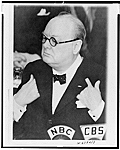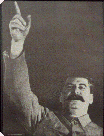Posted on July 27, 2002
Down The ICC Slope
New court nothing like Nuremburg
by
Daniel Clark
The tribunal at Nuremburg was not a proper legal proceeding. That might sound to you like a terrible thing to say. In fact, there are some places, like France, where you might be arrested for saying it. But it's true. There was no presumption of innocence on the part of the defendants at Nuremburg. Moreover, they were forbidden from making those arguments which were considered the most potentially effective ones. Although there were a couple minor figures who were acquitted, that was never a serious possibility for the ringleaders. Men like Hermann Goering, Alfred Rosenberg, and Joachim von Ribbentrop never stood a realistic chance of avoiding punishment.
This is just as it should have been. The purpose of the Nuremburg trials was never to determine whether these men were guilty. It was to demonstrate their already understood guilt to the rest of the world. The proceedings were less a trial than a documentary. The leaders of the Third Reich were not judged by their peers. Indeed, they had none. They were judged instead by their mortal enemies. That would hardly seem fair in an actual criminal trial, but those men deserved no trial. They were not criminal suspects, but prisoners of war, a distinction whose clarity has become tragically smudged as of late.

As difficult as it may be for one-worlders to swallow, the perpetrators of Nazi atrocities were not brought to justice by a diverse collection of international representatives, implementing their vision of world peace. They were punished by the victors of the war, who had won the right to impose their will through the exercise of deadly military force.
Winston Churchill wanted to simply execute the Fuhrer's henchmen, but he became convinced, as President Truman was, that a trial was needed to demonstrate the Allies' moral authority. This it did. Once the world saw the evidence -- the films of concentration camps, eyewitness testimony about live children being thrown into ovens, a shrunken, human head used as a paperweight by a commandant's wife, and many similar horrors -- few questioned the justice of the executions and prison sentences that were meted out.
Ever since its inception, the United Nations has tried in vain to develop a permanent version of the International Military Tribunal that presided over the hearings at Nuremburg. What it has done instead is produce a clumsy parody. The International Criminal Court was created on July 1st of this year, when its number of member states was increased by ten, to sixty-six. (A minimum of sixty nations needed to ratify the ICC in order for it to take effect.) Thankfully, it does not at this time, and hopefully will not ever, count the United States among its members.
President Clinton signed the ICC treaty on New Years Eve of the year 2000, less than a month before he left office. The Senate never ratified it, however, and President Bush has since removed the signature of the U.S. from the treaty. If only all of Clinton's deeds could be so easily undone.
The ICC treaty was drafted in Rome in 1998, but it was a very, very rough draft. In fact, it isn't nearly finished to this day. The Rome statute outlines four offenses to be prosecuted by the ICC: genocide, crimes against humanity, war crimes, and aggression. The last of these terms is left conspicuously undefined. But don't worry, the United Nations assures us that the member states of the ICC will decide what that means at some point in the future.
Had the U.S. ratified this treaty, it would have had one voice in sixty-seven. There would be little we could do to prevent the other member states from devising a definition of "aggression" that encompassed virtually any military action. That might be a tempting thing to do, for militarily insignificant member states like Andorra, Lesotho, and Trinidad & Tobago.
While the ICC promises to get around to defining "aggression," it gives no indication that it intends to clarify the other three offenses, its characterizations of which are all excessively broad. Included in the Court's definition of "genocide" is "causing serious bodily or mental harm" to the people being discriminated against. Mental genocide? How does that work, by hypnotizing others into thinking they're dead?

Among "crimes against humanity" is "extermination," which "includes the intentional infliction of conditions of life, inter alia the deprivation of access to food and medicine, calculated to bring about the destruction of part of a population." Inter alia means "among other things." Whatever those other things are is unknown. And how small can "part of a population" be? Isn't one individual person a "part" of a population? Perhaps the ICC will get around to explaining these things right after it figures out what "aggression" is.
One of the "war crimes" listed in the treaty is "killing or wounding treacherously individuals belonging to a hostile nation or army." How can you kill or wound such individuals treacherously? Belonging to a hostile nation, they already mistrust you implicitly.
Another "war crime" is "committing outrages upon personal dignity, in particular humiliating and degrading treatment." So you can shoot at the enemy, but you can't lower his self-esteem. If the U.S. were to sign and ratify this treaty, our soldiers could be considered criminals depending on how our enemies feel about being taken prisoner.
These rules are so broad that they could be applied to practically any act of war. They won't be, of course. In order for a case to be prosecuted by the ICC, a charge has to be filed by one or more of the member states, which they won't frequently do without reason -- at least not unless the United States becomes a member. If the U.S. were to join, every country that resents our military power and high standard of living would find an excuse to file a charge. First in line to do this would be the nations in the European Union.
It's no secret that many officials in the EU consider that entity to be in direct competition with the United States. Aside from wrangling with the U.S. over trade issues, the EU has also been critical of President Bush over what they call his "unilateralism" in regard to strategic missile defense, the proposed land mine treaty, and the creation of this same International Criminal Court. The ICC could allow the Euros to gain diplomatic leverage, by prosecuting one frivolous case after another against the U.S., and they'd have the clout to do it.
All fifteen current European Union members have ratified the ICC, as have nine countries which are now candidates for entry into the EU. That would potentially give them the ability to appoint twenty-four ICC judges to the USA's one. If you find that disconcerting, think what might happen if the ICC's prosecutorial powers fall into less friendly hands.
One thing that tainted the moral clarity of Nuremburg was the fact that murderous Soviet dictator Josef Stalin was allowed to appoint one of the four judges. From that, one might have drawn the conclusion that, absent the motive of racism, the murder of millions of innocent people is really no big deal. Imagine the confused messages that will be sent by a court in which practically any nation may participate.

One country already in the ICC, Brazil, holds a presidential election this October, and Luis da Silva of the Workers' Party is considered to have a strong chance of winning. If he does, the longtime Castro supporter and outspoken ally of Red China will be responsible for appointing his country's nominee to the ICC. The prospect of one of da Silva's Marxist stooges passing judgment on an American soldier or diplomat ought to be enough to make even the most pliant globalist begin parroting Pat Buchanan.
None of America's most hardened enemies currently belongs to the ICC, but what if the U.S. signs and ratifies the treaty, and China, Cuba, Iran, Iraq, Libya, North Korea and Saudi Arabia follow? The U.S.A. would soon be portrayed as a rogue state, and we would have given our antagonists the authority to make that determination.
Bush's "unsigning" the treaty (and no, he didn't make that word up himself) would appear to solve all these problems, but it doesn't quite do that. This is because the ICC assumes the power to prosecute citizens of nations that haven't even agreed to the treaty, as long as the offenses are alleged to have taken place in countries that have.
Happily, there's yet another difference between the ICC and Nuremburg, which is that the Nuremburg judgments were enforced by the three mightiest armies then remaining in the world. The ICC is a creation of the United Nations, whose military operations generally consist of sending ragtag collections of Third World-trained soldiers in highly visible Carolina blue helmets out in the open to get shot at. The American Servicemembers' Protection Act of 2002 grants the president authority to use military force to free American citizens from the ICC. The U.S. versus the U.N? It'll never happen. Those toffee-nosed elitists at the U.N. aren't about to force a showdown with the man they think they insult by calling a "cowboy."
So for the time being, this kangaroo criminal court doesn't threaten us. But keep in mind that, if the clairvoyant Florida canvassing boards had been allowed to continue their seance for votes much longer beyond the legal deadline, we'd now have as our chief executive the former vice president of the man who'd signed our name to the treaty in the first place. And he'd have his own party in control of the ratification process in the Senate.

It's not enough for President Bush to simply stave off the ICC for the next two or six years. He's got to make the American public understand why he's doing it, and share his outrage. Voters have got to make future presidents as terrified of entering pacts like the ICC as they are of reining in federal education spending.
The problem with the ICC is far worse than that it doesn't meet with America's national interests. The treaty is inherently unjust and amoral. While it's self-evident that all men are created equal, it's just as clear that all nations are not. Yet the structure of the ICC treats a nation like ours, governed by the consent of the people and founded on basic individual rights handed down by God, no differently than the most primitive despotism. Apparently, Bill Clinton did not take offense to that. But George W. Bush does, and so must we all.
The Shinbone: The Frontier of the Free Press
Mailbag . Issue Index . Politimals